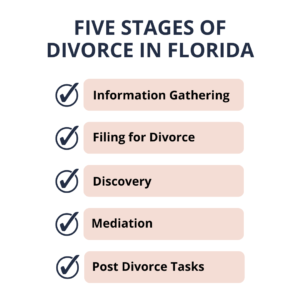Five Stages of a Divorce Case in Florida

When most people are considering a divorce, thinking about the legal process can seem confusing, overwhelming and even scary. Frankly, rightfully so. Family Law in Florida is a very complex and dynamic area of practice even for the most seasoned attorney. Know that if you are feeling overwhelmed by the process, you are in good company, and you have landed in the perfect spot. My goal is to give you a brief and digestible road map of the five main stages every divorce case will go through in Florida.
If you know me, you know I am a big believer in the power of knowledge. If you are considering a divorce or have already filed (or your spouse has filed), knowing what to expect can relieve some stress and anxiety as you work your way through the legal process.
Stage 1: Information Gathering
Once you have decided that divorce is right for you – it is time to educating yourself on the process. Florida is a no fault divorce state, simply put, no one has to prove anything to get a divorce. Either you or your spouse must state under oath that the marriage is “irretrievably broken” or that there isn’t anything the court could do to save your marriage. So when I say information gathering, that doesn’t mean compiling all the dirt on your soon to be ex, but to start educating yourself.
- Learn about the different options to obtain a divorce. I did a blog post about that which you can check out here.
- If you choose attorney assisted divorce – begin interviewing attorneys.
- Grab screenshots of all account balances (bank accounts, credit card accounts, student loan accounts, retirement accounts, any other kind of account you may have)
- Begin to compile copies of your financial documents
- Click here for a free download of my Separation Checklist
Stage 2: Filing for Divorce
Once you have selected an attorney and provided all the required information to them about your goals for the outcome of your case, your attorney will begin drafting the documents required to initiate a divorce case.
Documents required:
- Civil Cover Form
- Summons
- Petition for Dissolution of Marraige
- UCCJEA (if you have children)
- Notice of Related Cases
- Notice of Social Security Numbers
Once these documents are filed through the Florida Supreme Court online portal, the clerk of the court in the county where you reside will generally take 48 hours to return the signed summons to your attorney. Then the entire packet is forwarded to a process server to serve your soon to be ex in person. Once they are served they will have 20 calendar days to file an answer.
Stage 3: Discovery
Once the opposing party has been served, both of you will have 45 calendar days to complete Mandatory Disclosure. This is easily one of the worst parts of the case. Honestly, it can feel pretty invasive to provide all that is required. The Florida Family Law Rules of Procedure require each party to complete this process. I have a detailed checklist for all the documents proved to the court, you can download it here.
Mandatory Disclosure can easily be the most expensive part of the process – especially if you are unorganized. I encourage my clients to get working on gathering and organizing their documents right away. Organization of the documents is key. Your lawyer will be reviewing everything, so the longer it takes to sift through your files, the more expensive it will be. Keep in mind, your attorney will also have to sift through your spouse’s documents as well.
During this phase it is possible that additional discovery will be required. In that event, a Request to Produce, Standard Family Law Interrogatories will be filed, and will elongate the process. These are usually filed in highly contentious cases or when one party is trying hide assets.
Stage 4: Mediation
Once your attorney has reviewed the financials, they will be able to put together an equitable distribution chart to give you an idea of how to equally divide the assets and liabilities from the marriage and set mediation.
Mediation is required in all contested divorces in Florida. The vast majority of cases are settled there. Your attorney will set up a mediation prep appointment with you. During this appointment, you will discuss your goals for settlement including and not limited to:
- Drafting a proposed Parenting Plan if you have children
- Drafting a proposed Marital Settlement Agreement for all financial issues
- Making a list of must haves and nice to haves, along with things you don’t really care about
- Educating you on the mediation process itself
This one is a hard truth, but if mediation is successful, neither party will walk away in love with the final agreement. This is because it will be a compromise for both of you, you will both have to give a take a bit. However, it is the only opportunity for you to be in control of the outcome of your divorce. What I remind my clients is to ask themselves, “can I live with this agreement?“.
If you are unable to settle at mediation, this is called an impasse, and the next step is setting the case for trial. Only 5% of divorce cases in Florida end up having to be settled in court.
Stage 5: Post Divorce Tasks
Once you have reached a settlement agreement at mediation your attorney will submit the signed Marital Settlement Agreement, with an attached Parenting Plan and Child Support Guidelines to the court with a proposed final judgment. A final hearing will be scheduled. Usually it is the petitioner who will appear with their attorney to provide the required testimony on the record, which allows the court jurisdiction to grant your divorce. These are very easy questions and nothing to worry about. Most final hearings are held via zoom. Once the court has signed the final judgment – your divorce is officially granted, and the agreement you signed during mediation becomes an enforceable order of the court.
Tasks to be completed after your divorce:
- Change your name if you requested to return to your former name
- Update your estate plan (see this link to learn more)
- Sign any documents and make monetary transfers as required by your marital settlement agreement
As you can see, divorces cases can be lengthy and have many moving pieces. Have no fear, your attorney should walk you through each step, helping, and answering any questions you have. It can feel like the end of the world, but know, there is happiness on the other side!

